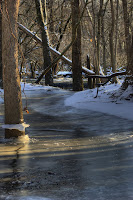Des Plaines River Journal: The inward life of winter

(POSTED: 2/15/10) Winter's white velvet cover has overlaid Dam Number Four Woods since well before the New Year. It was indeed a white Christmas. Snow brings purity to the landscape, and a temporary blessing of that snowfall is the disappearance of litter. The woods are quiet, summer parties have ceased and many of the bird species have migrated south for the winter. Now, soft angled winter light, often veiled by clouds, arrives each morning like a guest that will not stay long. Days are about nine hours long at solstice time near the end of December. My walks must wait for the weekends, as I arrive home from my work well after sunset at this time of year.
A heavy snowfall has settled in, and animal tracks punctuate the main walking trails. They also reveal slender game trails, less obvious in other seasons, that slither through the woods. And, on this morning's quiet walk, I met a sort of creature that I had not seen in this area before: a man in snow shoes. He uses them, he said, for exercise, and also for the adventure of walking off the beaten path upon deeper, untracked snow. I also recall a cold weather oddity from last winter: on a small, frozen backwater pond surrounded by these woods, two hearty fellows had set up hockey nets, donned their skates, and started a one-on-one game of hockey. Baffled, I observed them from the trail, as each man strived to play both offense and defense, and to tend goal when needed. Surely there are better circumstances in which to play the great northern sport, I thought. "It's great!" one player hollered in explanation after a slap-shot. "This is where hockey should be played!"
During a recent cold snap, much of the river has frozen over, but this year I have not ventured out on it yet. It will take a few more days of sub-freezing temperatures before I would dare it. Several years ago, during an extended cold snap, I did walk on the river, mindful of thin ice, after seeing quite a few other hikers safely making their way along it one afternoon. As I have not yet canoed this river, walking its icy surface gave me views of the river and its environments not easily obtained from the shoreline.

Walking the snow and ice-covered Des Plaines made clear for me that rivers such as this one were once truly major thoroughfares. First Americans and early traders slid down these watery super-highways, seeing the views of wooded banks I now see. Even a few yards away from the river, signs of modern times accumulate, but when directly on the river, enfolded by bankside growth, things must look something like they always have. Traffic overhead and airplane noise are nearly constant, so things unfortunately do not much sound like they once did. But I like to think that these from-the-river views are historic.
Perhaps Henry David Thoreau had similar thoughts and feelings, when he wrote, in his lovely essay, A Winter Walk, of a winter skate down a New England river: ". . . [W]e will take a journey on skates along the course of this meandering river . . . following the winding of the stream, now flowing amid hills, now spreading out into fair meadows, and forming a myriad coves and bays where the pine and hemlock overarch. The river flows in the rear of the towns, and we see all things from a new and wilder side . . . Our feet glide swiftly over unfathomed depths, where in summer our line tempted the pout and perch, and where the stately pickerel lurked in the long corridors formed by the bulrushes."
After a detailed description of his extended skating expedition, Thoreau allows that winter's short days, colder temperatures and sober colors invite contemplation. "In winter we lead a more inward life. We enjoy now . . . leisure, around warm stoves and fireplaces, and watch the shadows of motes in the sunbeams." It is a time, he reminds us, for hunkering down, for storytelling, for expansion of the soul. "Now commences," he concludes after his walk, "the long winter evening around the farmer's hearth, when [our] thoughts . . . travel far abroad, and men are by nature and necessity charitable and liberal to all creatures."
Some have criticized Thoreau for romanticizing nature, yet I believe that he simply valued it. He embraced what the natural world can bring to us at any time of year, however inhospitable the conditions. With this thought in mind, I headed inside, towards my own hearth, and to watch "the shadows of motes in the sunbeams" for a time.
By Jeff Wagner, for ChicagoWildlifeNews
Jeffrey Wagner, a graduate of Northwestern University and Indiana University, is a Chicago-area musician and writer who has published numerous articles in Clavier Magazine, and other journals. Since boyhood, he has loved the outdoors, and has hiked, camped and back-packed all over the United States.
Contact: [email protected] or [email protected]
Photo by Stew Cherlin


0 comments: